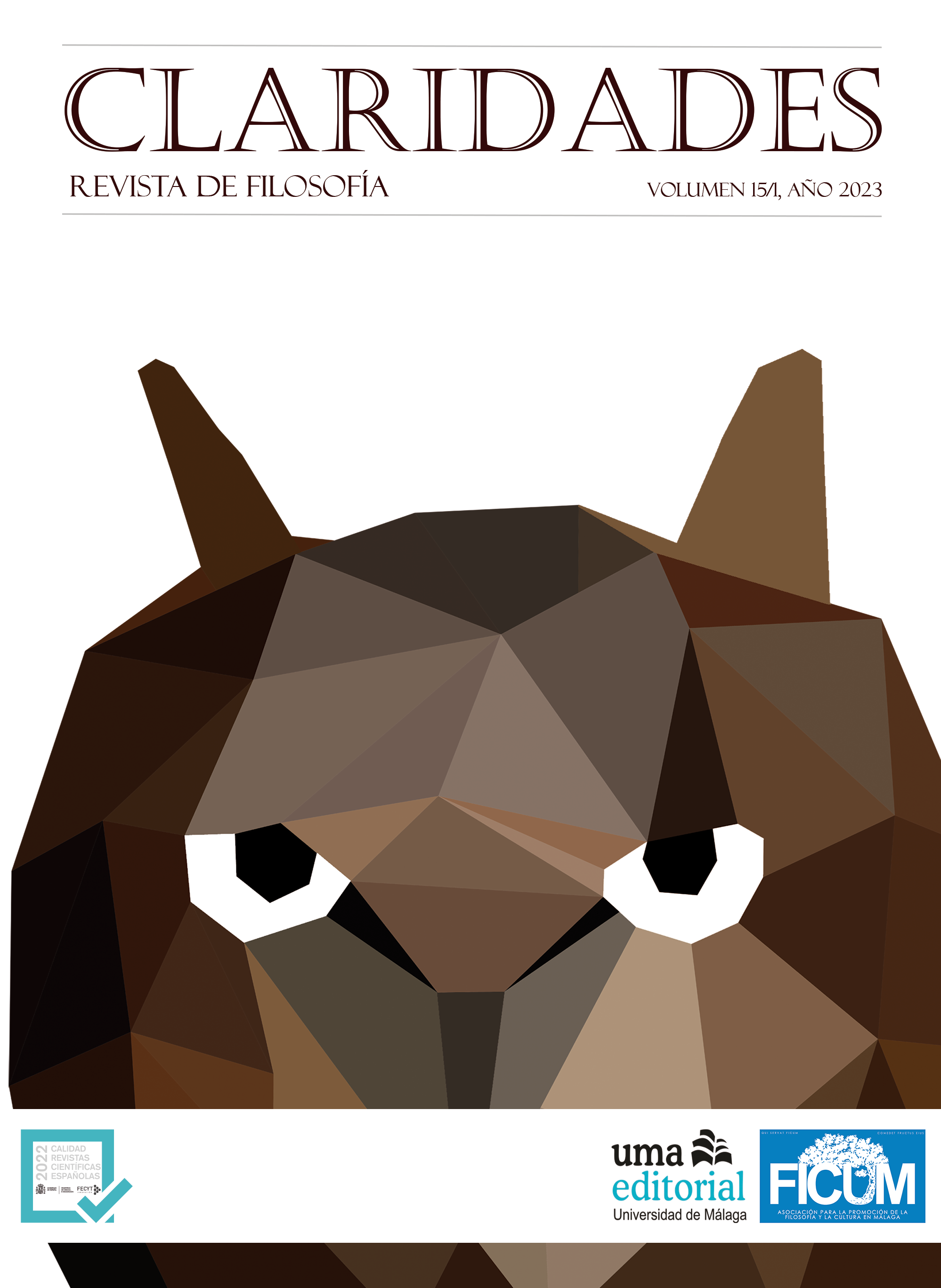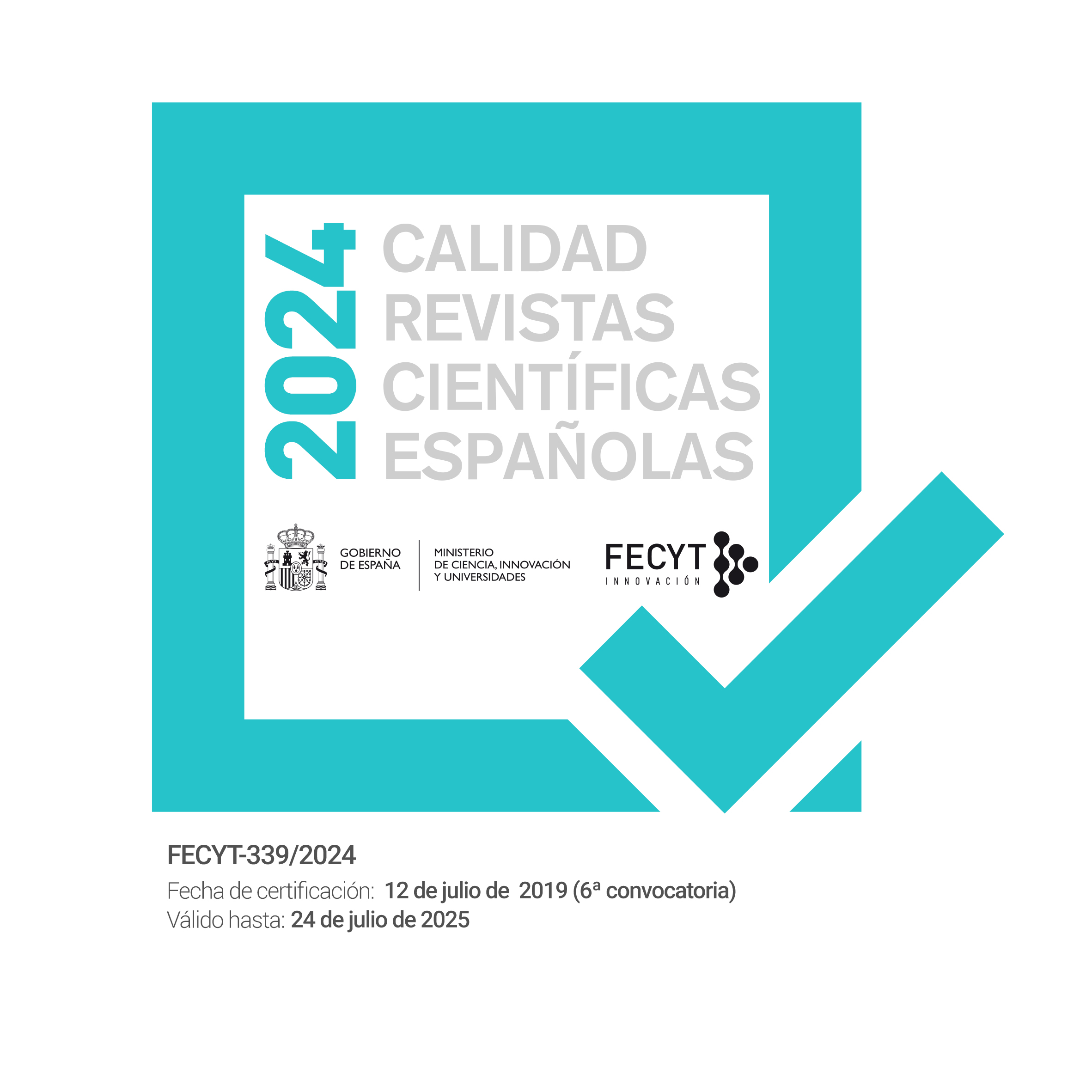Irrationalism is a pessimism
The emptying of finality in Schopenhauer´s teleology
DOI:
https://doi.org/10.24310/Claridadescrf.v15i1.13918Keywords:
Schopenhauer, purpose, pessimism, irrationalism, historyAbstract
The following paper has the purpose to highlight the tragic contrast between the natural teleological assumption and the absence of moral teleology in Schopenhauer´s thought. His philosophical gesture will be understood as the emptying of finality. Concretely, I will examine how the absurd which takes place by virtue of said contrast, added to the conception of life that
beats in Schopenhauerian project, drives to a necessary irrational and pessimist consideration of existence. From the author’s perspective, if there is no rational purpose for the world, then then there isn’t any other path but pessimism. In this direction, I would like to focus in one of the most radical consequences of the premises mentioned (known as, the lack of the final purpose, the irrationalism, the guise of teleological adjustment and the conception of life). I’m talking
about the impossibility of history and, along with it, the impossibility of any kind of change or transformation. Finally, I will try to clear up two possible suspicions regarding the irrationality and absence of final end [Endzweck] in Schopenhauer’s philosophy.
Downloads
Metrics
Publication Facts
Reviewer profiles N/A
Author statements
Indexed in
-
—
- Academic society
- N/A
- Publisher
- Asociación para la promoción de la filosofía y la cultura en Málaga (FICUM) y UMAEditorial
References
Gottfried, P. (1975): «Arthur Schopenhauer as a Critic of History», Journal of the History of Ideas, 36 (2), pp. 331-338.
Kant, I. Werkausgabe in zwölf Bänden, hrsg. von W. Weischedel. Frankfurt: Suhrkamp.
Kant, I. (1992): Crítica de la facultad de juzgar. Trad. Pablo Oyarzún. Caracas: Monte Ávila Editores. [KU]
Kant, I. (2011): Sobre el fracaso de todo ensayo filosófico en la Teodicea. Trad. Rogelio Rovira. Madrid: Encuentro. [Mißlingen]
Lovejoy, A. O. (1911): «Schopenhauer as an evolucionist», The monist, 21 (2), pp. 195-222.
Magee, B. (1991): Schopenhauer. Trad. Amaia Bárcena. Madrid: Cátedra.
Mainländer, P. (2011): La filosofía de la redención: antología. Trad. Sandra Baquedano. Santiago: Fondo de Cultura Económica.
Mateu Alonso, J. D. (2017): «La crítica schopenhaueriana de la historia». Schopenhaueriana. Revista española de estudios sobre Schopenhauer, 2, pp. 9-26.
Philonenko, A. (1989): Schopenhauer. Una filosofía de la tragedia. Trad. Gemma Muñoz-Alonso. Barcelona: Anthropos.
Ribot, Th-A. (1879): La filosofía de Schopenhauer. Trad. Mariano Arés. Salamanca: Jacinto Cerezo.
Rodríguez Tapia, R. (2016): Conversaciones con Arthur Schopenhauer. Testimonio sobre la vida y la obra del filósofo pesimista. Trad. Luis Fernando Moreno Claros. Barcelona: Acantilado.
Rosset, C. (2005): Escritos sobre Schopenhauer. Valencia: Pre-textos.
Rosset, C. (2012): Schopenhauer. Filósofo del absurdo. Trad. Silvio Mattoni. Buenos Aires: El cuenco de plata.
Ruiz Callejón, E. (2007): «El concepto de «conciencia mejor» en Schopenhauer». Pensamiento, 63 (237), pp. 437-462.
Safranski, R. (1991): Schopenhauer y los años salvajes de la filosofía. Trad. José Planells Puchades. Madrid: Alianza.
Schopenhauer, A. Werke in fünf Bänden, hrsg. von Ludger Lütkehaus. Zürich: Haffmans Verlag.
Schopenhauer, A. (1999): Escritos inéditos de juventud (1808-1818). Trad. Roberto R. Aramayo. Valencia: Pre-textos. [EJ]
Schopenhauer, A. (2001): Metafísica de las costumbres. Trad. Roberto R. Aramayo. Madrid: Trotta. [MS]
Schopenhauer, A. (2003): El mundo como voluntad y representación. Vols. I-II. Trad. Roberto R. Aramayo. Madrid: Fondo de cultura económica de España. [WWV]
Schopenhauer, A. (2009): Parerga y Paralipómena. Vols. I-II. Trad. Pilar López de Santamaría. Madrid: Trotta. [PP]
Schopenhauer, A. (2012): La voluntad en la naturaleza. Trad. Miguel de Unamuno. Madrid: Alianza. [WN]
Schopenhauer, A. (2016): «Sobre el fundamento de la moral». Los dos problemas fundamentales de la ética. Trad. Pilar López de Santa María. Madrid: Siglo XXI. [PGM]
Schopenhauer, A. (2017): Teil 4: Metaphysik der Sitten. Vorlesung über Die gesamte Philosophie oder die Lehre von Wesen der Welt und dem menschlichen Geiste, hrsg. von Daniel Schubbe. Hamburg: Felix
Meiner Verlag.
Schopenhauer, A. (2019): Sobre la cuádruple raíz del principio de razón suficiente. Trad. Pilar López de Santa María. Madrid: Alianza. [WSzG]
Simmel, G. (2004): Schopenhauer y Nietzsche. Trad. Francisco Ayala. Sevilla: Ediciones Espuela de Plata.
Slaboch, M. (2015): «”Eadem, sed aliter”: Arthur Schopenhauer as a Critic of Progress», History of European Ideas, 41 (7), pp. 931-947.
Downloads
Published
How to Cite
Issue
Section
License
Copyright (c) 2023 Begoña Pessis García

This work is licensed under a Creative Commons Attribution-NonCommercial-ShareAlike 4.0 International License.
Esta revista provee acceso libre inmediato a su contenido bajo el principio de hacer disponible gratuitamente la investigación al público. Todos los contenidos publicados en Claridades. Revista de Filosofía, están sujetos a la licencia Creative Commons Reconocimento-NoComercia-Compartirigual 4.0 cuyo texto completo puede consultar en <http://creativecommons.org/licenses/by-nc-sa/4.0>
Es responsabilidad de los autores/as obtener los permisos necesarios de las imágenes que están sujetas a derechos de autor.
Los autores/as cuyas contribuciones sean aceptadas para su publicación en esta revista conservarán el derecho no exclusivo de utilizar sus
contribuciones con fines académicos, de investigación y educativos, incluyendo el auto-archivo o depósito en repositorios de acceso abierto de cualquier tipo.
La edición electrónica de esta revista esta editada por la Editorial de la Universidad de Málaga (UmaEditorial), siendo necesario citar la procedencia en cualquier reproducción parcial o total.

















6.png)
